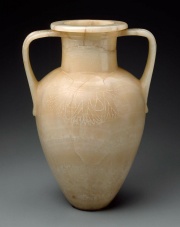Difference between revisions of "Egyptian alabaster"
Jump to navigation
Jump to search
| (One intermediate revision by the same user not shown) | |||
| Line 1: | Line 1: | ||
| − | [[File:24.599-SC54044.jpg|thumb|]] | + | [[File:24.599-SC54044.jpg|thumb|Tablet for oils<br>MFA# 24.599]] |
== Description == | == Description == | ||
| Line 6: | Line 6: | ||
See also [[travertine]]. | See also [[travertine]]. | ||
| − | [[File:44.30-E2361CR-d1.jpg|thumb|]] | + | [[File:44.30-E2361CR-d1.jpg|thumb|Egyptian jar<br>MFA# 44.30]] |
== Synonyms and Related Terms == | == Synonyms and Related Terms == | ||
Latest revision as of 10:47, 22 August 2020
Description
A white, translucent, Limestone onyx stone with golden-brown stripes. Egyptian alabaster is a dense, Calcium carbonate stone that has been quarried near Hatnub, Egypt since the 1st century. Egyptian alabaster is not, as its name indicates, a true Alabaster (i.e. Gypsum) stone.
See also Travertine.
Synonyms and Related Terms
cotognino; limestone onyx; travertine; calc-sinter; calcareous sinter; Ägyptischer Alabaster (Deut.)
Resources and Citations
- B.Aston, J.Harrell, I.Shaw, "Stone" in Ancient Egyptian Materials and Technology, P.Nicholson, I.Shaw (eds.), Cambridge University Press, 2000, p. 59-60.
- Jack Odgen, Jewellery of the Ancient World, Rizzoli International Publications Inc., New York City, 1982
- Luciana and Tiziano Mannoni, Marble: the history of a culture, Facts on File Publications
- Frank A. Lent, Trade names and Descriptions of Marbles, Limestones, Sandstones, Granites and Other Building Stones Quarried in the United States Canada and other Countries., Stone Publishing Co, New York, 1925

